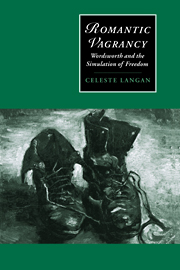Book contents
- Frontmatter
- Contents
- Acknowledgments
- List of abbreviations
- A methodological preamble
- Introduction
- 1 Rousseau plays the beggar: the last words of citizen subject
- 2 Money walks: Wordsworth and the right to wander
- 3 Walking and talking at the same time: the “two histories” of The Prelude
- 4 The walking cure
- Notes
- Works cited
- Index
- CAMBRIDGE STUDIES IN ROMANTICISM
3 - Walking and talking at the same time: the “two histories” of The Prelude
Published online by Cambridge University Press: 19 October 2009
- Frontmatter
- Contents
- Acknowledgments
- List of abbreviations
- A methodological preamble
- Introduction
- 1 Rousseau plays the beggar: the last words of citizen subject
- 2 Money walks: Wordsworth and the right to wander
- 3 Walking and talking at the same time: the “two histories” of The Prelude
- 4 The walking cure
- Notes
- Works cited
- Index
- CAMBRIDGE STUDIES IN ROMANTICISM
Summary
THE TWO HISTORIES OF THE PRELUDE
No shock
Given to my moral nature had I known
Down to that very moment–neither lapse
Nor turn of sentiment–that might be named
A revolution, save at this one time:
All else was progress on the self-same path
On which with a diversity of pace
I had been travelling; this, a stride at once
Into another region.
(The Prelude [1805], x.233–41)He must have lived this war, in himself, according to two temporalities or two histories that were at the same time disjoined and inextricably associated. On the one hand, youth and the years of Occupation appeared there as a sort of prehistoric prelude: more and more distant, derealized, abstract, foreign. The “real” history, the effective and fruitful history, was constituted slowly, laboriously, painfully after this rupture which was also a second birth. But on the other hand and inversely, the “real” events (public and private), the grave, traumatic events, the effective and indelible history had already taken place, over there, during those terrible years … His “living present,” as someone might put it, was the crossroads of these two incompatible and disjunctive temporalities, temporalities that nonetheless went together, articulated in history, what was his history, the only one.
In the ideal exchange imagined for this essay, readers quickly scanning their memories for the moment to which Wordsworth refers in the passage above would be inclined to nominate “the French Revolution,” or perhaps, “the Terror”; our tendency to regard Wordsworth's proper region as the English Lake District might be responsible for this desire to construct Wordsworth's “Residence in France” as the literal referent for his unhappy stride into another region.
- Type
- Chapter
- Information
- Romantic VagrancyWordsworth and the Simulation of Freedom, pp. 139 - 224Publisher: Cambridge University PressPrint publication year: 1995



